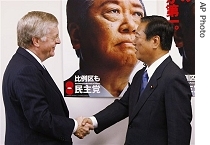-
(单词翻译:双击或拖选)
Tokyo
08 August 2007
With opposition1 control of Japan's Upper House heralding2 possible change in the traditionally strong alliance between Japan and the United States, U.S. Ambassador to Japan Thomas Schieffer has met with the leader of the Democratic Party of Japan, Ichiro Ozawa. The two men sparred over whether Japan's contribution to U.S.-led military actions in Iraq and Afghanistan would continue. Liz Noh reports from Tokyo.
In a room packed with Japanese media at the Democratic Party of Japan headquarters, U.S. Ambassador Thomas Schieffer and the leader of Japan's main opposition party, Ichiro Ozawa, met on Wednesday for the first time since the Upper House elections.

US Ambassador to Japan Thomas Schieffer, left, is greeted by Japan's main opposition Democratic Party of Japan leader Ichiro Ozawa prior to their meeting at Ozawa's office in Tokyo, 8 Aug 2007
Ozawa has said he plans to oppose the extension of Japan's anti-terrorism law, which allows the Japanese navy in the Indian Ocean to provide fuel and supplies to U.S.-led coalition3 forces in Afghanistan. He also wants to withdraw the 200 air force personnel stationed in Kuwait, airlifting supplies to U.S. troops in Iraq.
Ambassador Schieffer stressed Japan's vital contributions to the coalition taskforce in fighting terrorism.
"When we think of this issue, we think of it as really an issue that we hope would be above partisan4 politics in Japan," Schieffer said. "And we think that this is an international task force that has been put together to oppose terrorism."
Ozawa patiently listened to Schieffer's 15-minute presentation. But his final response was firm.
Ozawa says the U.S.-led operations, in which Japan currently participates, do not have United Nations Security Council authorization5.
He said that he shared U.S. views on terrorism, but thinks each country should choose its own method to fight it. He supports Japan's contributions in the world, but says they must fall within the framework of a multinational6 effort, endorsed7 by the United Nations.
The meeting ended as each party presented their case.
Japan's anti-terrorism law expires November 1. It has been extended three times since the law was enacted8 under former Prime Minister Junichiro Koizumi.
Japan's current Prime Minister Shinzo Abe wants to extend it again. Opposition control of the Upper House could at least stall that extension.
 收听单词发音
收听单词发音
1
opposition

|
|
| n.反对,敌对 | |
参考例句: |
|
|
|
2
heralding

|
|
| v.预示( herald的现在分词 );宣布(好或重要) | |
参考例句: |
|
|
|
3
coalition

|
|
| n.结合体,同盟,结合,联合 | |
参考例句: |
|
|
|
4
partisan

|
|
| adj.党派性的;游击队的;n.游击队员;党徒 | |
参考例句: |
|
|
|
5
authorization

|
|
| n.授权,委任状 | |
参考例句: |
|
|
|
6
multinational

|
|
| adj.多国的,多种国籍的;n.多国籍公司,跨国公司 | |
参考例句: |
|
|
|
7
endorsed

|
|
| vt.& vi.endorse的过去式或过去分词形式v.赞同( endorse的过去式和过去分词 );在(尤指支票的)背面签字;在(文件的)背面写评论;在广告上说本人使用并赞同某产品 | |
参考例句: |
|
|
|
8
enacted

|
|
| 制定(法律),通过(法案)( enact的过去式和过去分词 ) | |
参考例句: |
|
|
|















